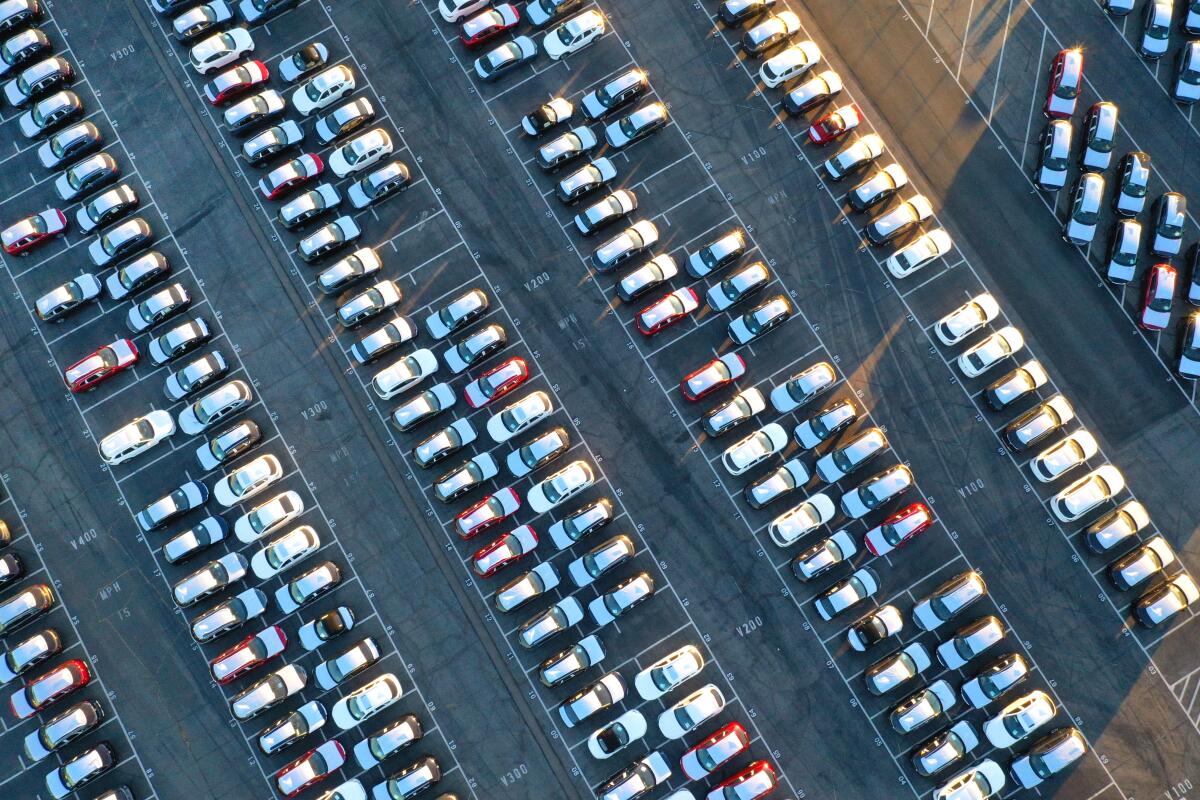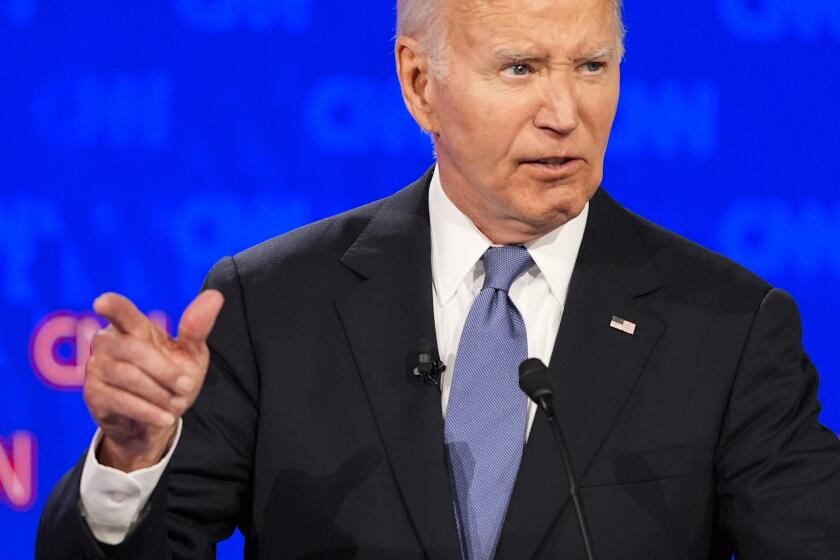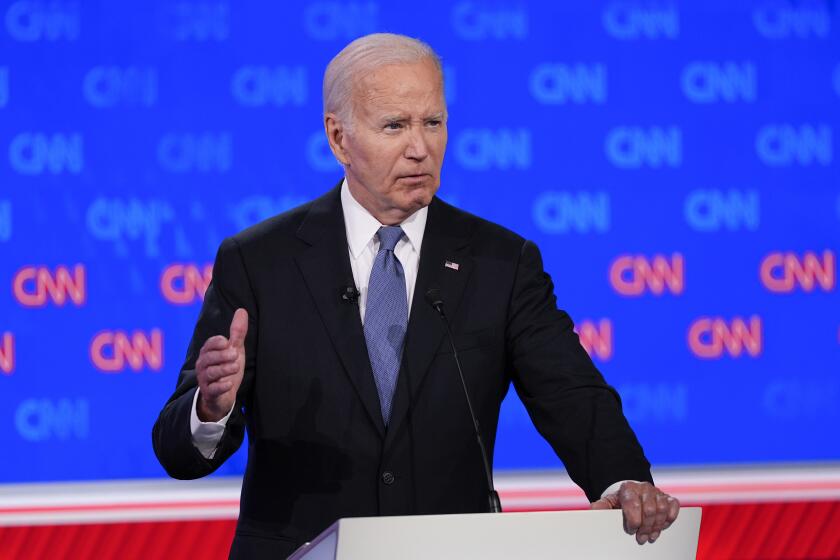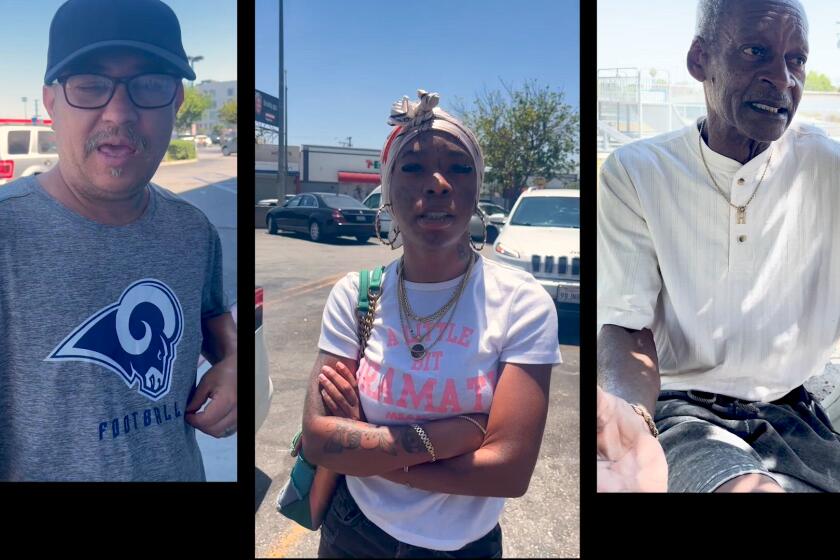Essential Politics: Behind the scenes of our reporting on how California shapes the nation

When we talk about climate policy, we often frame the issue as one with clear sides and clear choices. We are either looking for solutions and alternatives to current practices, or we are kicking the can down the road and hoping future generations will pick it up.
If only it were that simple. Like any path forward, figuring out how to address climate change is a journey with twists, turns and contradictions. No state knows that better than California, which leads the nation on tough emissions standards and in its push for electric vehicles.
As my colleague Evan Halper reports, the state is also finding that these vehicles — for all their benefits over gas-powered ones — have hidden challenges, too. Among the biggest questions: as the U.S. seeks to reduce its reliance for materials on countries like China, where will we get all the components needed for electric car batteries?
The answer could be off the coast of California.
But as companies move toward scraping the seabed for these materials, alarmed oceanographers and advocates warn they are literally in uncharted waters. And that’s just one act in a fast-unfolding, ethically challenging and economically complex drama that stretches around the world, from the cobalt mines of Congo, to the corridors of the Biden White House, to fragile desert habitats throughout the West.
This story is part of a new series titled “United States of California,” aimed at unpacking the wins, the losses and the game-changing moments for California in its role in guiding the policy direction of the nation on climate change and beyond.
I spoke with Evan about the piece and what’s next for this project. Our conversation has been lightly edited for clarity.
Get our L.A. Times Politics newsletter
The latest news, analysis and insights from our politics team.
You may occasionally receive promotional content from the Los Angeles Times.
The United States of California
Let’s start with your first piece. What made you start digging into supply chains and batteries?
Halper: I’d been writing about California’s push for electric cars for years, so it was a topic that naturally interested me. But the supply chain challenges came across my radar as the Biden administration was ordering agencies to urgently address China’s control of so many of the resources needed to make the batteries, amid this huge transition away from internal combustion engines.
One of the outfits lobbying those agencies aggressively, I would find, was the Metals Company, which wants to scrape the sea floor for million-year-old polymetallic nodules. I hadn’t read much about that effort, but as soon as I started looking into it, I realized this was really big — and a story that is very linked to California. Seemed a perfect way to launch this series.
How did you approach reporting this idea out? It’s a large story with lots of moving parts.
Once I started looking around, I found a pretty substantial paper trail. The departments of Defense and Energy had invited stakeholders to provide them with ideas and concerns around the supply chain, which created quite a large administrative record revealing the points of tension and the plans some of these companies have.
Buried within it was also a roadmap of sorts of where the mining is proposed, and who is most alarmed about it. We used it as a springboard for shoe-leather reporting that targeted the lawsuits at big mining operations, the fight at the International Seabed Authority, and the proceedings of the Lithium Valley Commission in the Salton Sea region.
Where did the idea for “United States of California” come from? Can you talk about what the name means?
So many of the policies coming from Washington and statehouses nationwide are built around and impacted by plans that were first launched in California. It is one of the things that struck me when I got to D.C. during the Obama administration, after I had been in Sacramento many years. We looked at this when Biden was first elected: His agenda leaned heavily on California as a kind of think tank. Readers were really interested in that story, and we believe there is a lot more to tell.
So this series is looking at the many sectors where California is forging the path and what that means for the state and the rest of the country. Sometimes things veer in different directions than the state had planned. Sometimes they work out exactly as planned. But now is an ideal time to be diving into this. The state is at an inflection point, struggling with wealth inequality, rampant wildfire, political instability. Will it keep its title as America’s premier incubator of pioneering policies?
What do you hope people will take away from this project?
We hope people will read these stories and develop an appreciation not just of the state’s role in American democracy, but also how the usual talking points from the right and the left don’t do justice to the nuance and complexity involved in tackling the vexing challenges California is taking on. We will be taking a hard look at where these policies have changed people’s lives, and where the best intentions were undermined by ideological rigidity and money in politics.
I invite readers to reach out if they would like to share any of their own ideas. They can find me at evan.halper@latimes.com.
It’s really tempting to a lot of people to look for a clear answer (e.g. that electric car batteries are “good” or “bad” for the environment). But as you get at in your story and the larger project, the issues that California is confronting elude easy answers. How do you navigate that lack of clarity as you explore them? How have readers responded so far?
That’s an excellent point. I’ve been thinking a lot about that since the first piece ran, and the takeaway for some readers was that the batteries are bad, or that I was a shill for the oil companies, or that we were implicitly endorsing hydrogen-powered cars. That wasn’t meant to be the takeaway of a piece aimed at getting people to think about the tradeoffs involved in this transition and asking if we are making it in the most sustainable way possible. Some suggested we should have had more in the story about some of the innovations that could make the process of manufacturing and recycling the batteries greener. It is a fair point and one I’ll be considering as we weigh how to frame some of the other stories in the series.
Enjoying this newsletter? Consider subscribing to the Los Angeles Times
Your support helps us deliver the news that matters most. Become a subscriber.
The view from Washington
— Four Capitol and Metropolitan Police Department officers on Tuesday recounted their experience fighting off the Jan. 6 insurrection at the U.S. Capitol during the first hearing of a new House committee investigating the attack, writes Sarah D. Wire.
— Congress is moving to authorize financial aid to dozens of American officials suffering brain injuries caused by a mysterious ailment often called the Havana syndrome, reports Tracy Wilkinson.
— The nascent FireGuard program has relied on temporary permission from the Pentagon to review classified data collected from a variety of government sources to pinpoint wildfires. But that access could end as soon as September, and the Pentagon hasn’t acted on a pending one-year renewal request, or on a separate request from California lawmakers to make the pilot program permanent, Jennifer Haberkorn and Anna M. Phillips write.
— Vice President Kamala Harris helped pave the way, and more Indian Americans than ever are running for Congress. Swetha Kannan, Sandhya Kambhampati and Rahul Mukherjee take a look at the data on this growing demographic in American politics.
The view from the West
— Gov. Gavin Newsom compared choosing to remain unvaccinated to drunk driving and denounced high-profile conservatives including Fox News host Tucker Carlson in a rare public rebuke as COVID-19 spreads in California and adds political pressure to the recall election, Taryn Luna writes.
— Low-income Californians 50 and older will be eligible for healthcare regardless of immigration status under a law extending benefits to 235,000 residents in the country illegally, reports Melody Gutierrez.
— From Melanie Mason: President Biden’s job performance rating among Californians has dipped slightly in recent months, even as his infrastructure and domestic spending plans register as highly popular, according to a new poll released Wednesday.
— For a great number of Texans, the Alamo is the holiest of holies, a place, a totem, a shrine that physically embodies the values — courage, independence, liberty — they hold precious. As a new book makes clear, that veneration is based on a lot of made-up stuff, columnist Mark Z. Barabak writes.
The latest on the recall
— From Phil Willon: Californians who say they expect to vote in the September recall election are almost evenly divided over whether to remove Gov. Gavin Newsom from office, according to a new UC Berkeley Institute of Governmental Studies poll co-sponsored by the Los Angeles Times.
— Meanwhile, conservative talk radio host Larry Elder leads the race among Newsom’s opponents, with many voters still undecided.
Stay in touch
Keep up with breaking news on our Politics page. And are you following us on Twitter at @latimespolitics?
Did someone forward you this? Sign up here to get Essential Politics in your inbox.
Until next time, send your comments, suggestions and news tips to politics@latimes.com.
Get the L.A. Times Politics newsletter
Deeply reported insights into legislation, politics and policy from Sacramento, Washington and beyond. In your inbox three times per week.
You may occasionally receive promotional content from the Los Angeles Times.



